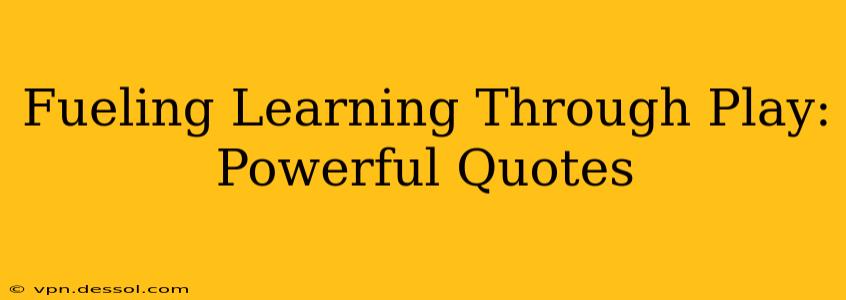Play is not just child's play; it's a fundamental process of learning and development, crucial across the lifespan. From early childhood to adulthood, playful activities stimulate creativity, problem-solving skills, and social-emotional growth. This exploration delves into the power of play-based learning through insightful quotes that highlight its transformative impact on education. We'll also examine how integrating playful elements into the learning process can revolutionize the educational experience.
Why is Play Important for Learning?
Play isn't merely a frivolous pastime; it's a powerful catalyst for learning. It provides a safe and engaging environment for children (and adults!) to explore, experiment, and discover. Through play, individuals develop essential cognitive, social, emotional, and physical skills. The inherent joy and intrinsic motivation associated with play make the learning process more effective and enjoyable.
Powerful Quotes on the Importance of Play in Learning
Several influential thinkers have eloquently captured the essence of play's role in learning. Here are some powerful quotes that highlight its significance:
-
"Play is the highest form of research." —Albert Einstein: This quote underscores the exploratory and investigative nature of play. Children, through playful experimentation, essentially conduct their own "research," learning through trial and error, observation, and creative problem-solving.
-
"The best kind of learning is play." —Unknown: This simple yet profound statement encapsulates the innate connection between play and effective learning. The joy and engagement inherent in play make it a naturally effective learning tool.
-
"Play is the work of childhood." —Friedrich Froebel: Froebel, considered the father of kindergarten, recognized the vital role of play in a child's development. He saw play not as idle time, but as essential "work" contributing to growth.
-
"Play is not a luxury. Play is a necessity." —Stuart Brown, MD: This quote emphasizes the critical importance of play, not as an optional extra, but as a fundamental human need, vital for healthy development.
How Can We Integrate Playful Learning Strategies?
The power of play is undeniable. But how can educators and parents effectively integrate it into learning?
Incorporating Games and Activities:
- Gamification: Transforming learning tasks into games can increase engagement and motivation. Points, badges, and leaderboards can add a competitive element that encourages participation.
- Role-playing: Enacting scenarios helps students understand concepts better. This is especially effective for subjects like history, literature, or social studies.
- Creative arts: Art projects, music, and drama provide alternative avenues for expression and learning. These activities allow children to showcase their understanding in unique and engaging ways.
- Outdoor play: Nature-based learning through outdoor activities promotes physical activity, improves focus, and connects students with the natural world.
Creating a Playful Learning Environment:
- Flexibility and Choice: Offering students choices in their learning activities fosters autonomy and increases engagement.
- Collaboration and Teamwork: Group activities and collaborative projects encourage social interaction and communication skills.
- Humor and Positive Reinforcement: Injecting humor and celebrating successes creates a supportive and motivating atmosphere.
Addressing Common Concerns About Play-Based Learning
Is play-based learning effective for all subjects?
Yes, play-based learning can be adapted to suit various subjects. While it's more readily associated with early childhood education, its principles can be effectively integrated into higher-level learning through creative approaches and appropriate modifications.
Doesn't play-based learning lack structure and discipline?
While play provides room for exploration and autonomy, effective play-based learning incorporates clear learning objectives and frameworks. The teacher or facilitator acts as a guide, scaffolding the learning process and providing structure where necessary.
How do you measure success with play-based learning?
Success in play-based learning isn't always measured through traditional assessments. Observations of student engagement, creative problem-solving, collaboration, and emotional development can provide valuable insights into the learning process. Informal assessments and projects can also demonstrate mastery of concepts.
In conclusion, embracing playful pedagogy is not merely a trend; it's a powerful strategy to enhance learning outcomes and foster a love of learning. By integrating playful activities into the learning process, educators and parents can unlock students' potential and create a more engaging and effective learning experience. The quotes presented here serve as a potent reminder of the profound influence of play on learning and development.

